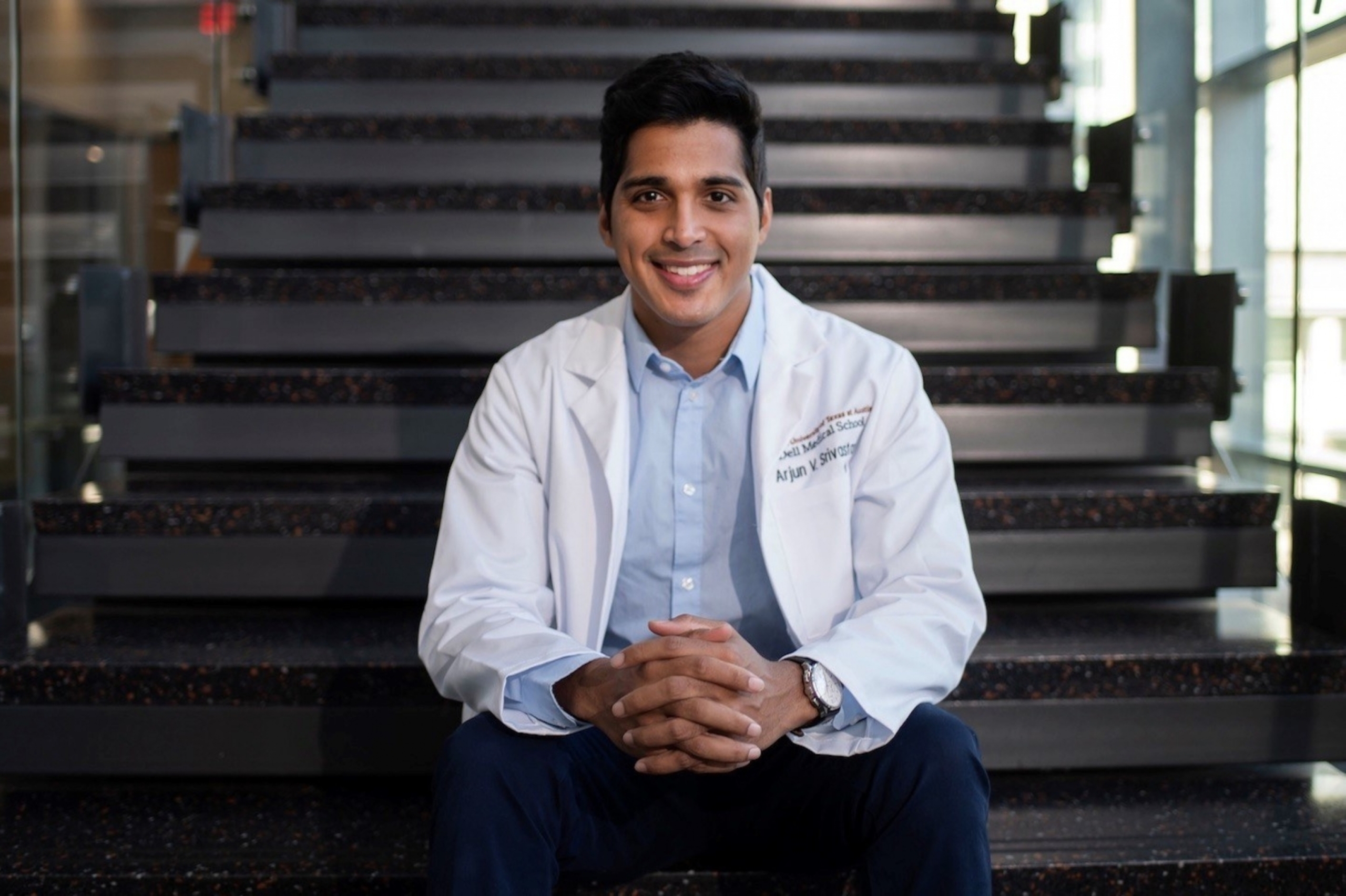Suicide remains the second leading cause of death among people aged 10-34, and overall suicide rates have increased by 35% since 1999. In the wake of the COVID-19 pandemic, the American Academy of Pediatrics, American Academy of Child and Adolescent Psychiatry, and Children’s Hospital Association recently declared children’s mental health as a national emergency.
Arjun Srivastava, third-year medical student, knows these statistics and their effects firsthand. And while he’s looking ahead to a career in psychiatry, he’s not waiting until then to start doing the work.

Arjun Srivastava, third-year medical student at Dell Med.
Q&A
What’s the problem you’re hoping to solve, and how did you come to recognize it?
I lost my friend and classmate to suicide during my first year of college. This tragedy was devastating to our community, and I recognized how little I knew about suicide and mental illness. I questioned how my friends and I had not recognized his pain or picked up on a potentially severe mental health issue; was there something I could have done to help him? I spent my remaining undergraduate years immersed in suicide prevention work, working with students and affected families. I worked closely with our Counseling and Mental Health Center in a number of leadership positions to promote mental health awareness, decrease barriers to care and raise funds for our suicide prevention program.
As a medical student, I have had opportunities to take part in the care of patients living with mental illness. My time with these patients deepened my passion for understanding mental health and provided additional insight into obstacles that persist in society.
What are you doing about it?
Currently, I am an officer in the Dell Medical School Psychiatry Interest Group, where we aim to provide medical students with enriching educational experiences, opportunities for community service and research, and connections with psychiatry mentors.
Now, at the early stages of my research career, I have contributed to published works in psychiatry related to the management of ADHD and gender dysphoria. Under the mentorship of Drs. Charles Nemeroff and Jeffrey Newport, I am working to participate in the Childhood Trauma Research Network, a research initiative of the Texas Child Mental Health Care Consortium. The objective is to develop a participant registry allowing characterization of risk profiles among children and the efficacy of systems and interventions, which in turn will facilitate analysis of health outcomes for children in Texas with exposure to traumatic life events.
And with four Dell Med classmates, I helped found an initiative called Vax Advocates — a program to equip high school students with health communication, advocacy and project management skills that empower them to address the significant disparities in COVID-19 vaccination that persist in marginalized and underserved populations. Throughout this experience I have gained insight into the impact COVID-19 has had on adolescent mental health, and how tangible efforts can be made to begin addressing this national health care emergency.
What makes you positioned to approach this problem?
My undergraduate experiences with mental health promotion and suicide prevention work ignited my desire to help alleviate pain in patients and families affected by mental illness. I also learned a considerable amount through founding a men’s mental health discussion group on campus and facilitating educational talks and group discussions on suicide prevention and resiliency through our Counseling and Mental Health Center. As an undergraduate research assistant in a clinical neuroscience laboratory, I developed a fascination for the human brain and topics such as cognition and neurotransmission. These experiences were instrumental in laying the foundation that brought me to this point and continue to serve as a driving force for my passion in this engaging field.
I am now fortunate to be a part of an incredible medical school and have opportunities to interact with and learn from our world-class psychiatry community. I have begun to partake in research in the field, which has provided me with insights into the future of psychiatry and areas I would like to focus on moving forward in my career. In addition to my medical studies, my dual master’s in educational psychology has provided unique insights into the human mind and behavior and fostered an interest in the world of academic medicine and research.
The New York Times asks readers to tell their “Tiny Love Stories” in just 100 words. What’s yours?
A Helping Hand; The Cycle of Life
We were severely premature twins when my grandmother left India to take care of us. She raised us until we were 14 and I have hundreds of precious memories; one includes her holding my small arm, providing comfort as we crossed a road with stray dogs that frightened me. Graduating high school, I remember a picture of my sister and me towering over my grandmother’s petite frame. I recall holding her arm and supporting her as she walked slowly to her seat. The previous memory flashed through my mind. I smiled as I recognized the true meaning of giving back.
This news feature is part of Dell Med’s Voices, a series of profiles that highlight the people of Dell Med as they work to improve health with a unique focus on our community.